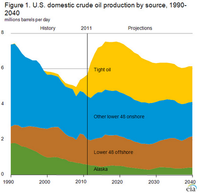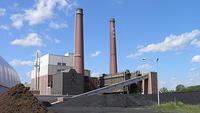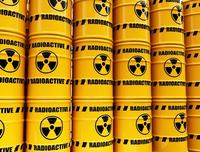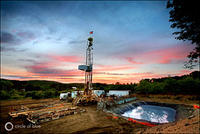-
Inkblots bolster security of online passwords
Computer scientists have developed a new password system that incorporates inkblots to provide an extra measure of protection when, as so often occurs, lists of passwords get stolen from websites. This new type of password, dubbed a GOTCHA (Generating panOptic Turing Tests to Tell Computers and Humans Apart), could foil growing problem of automated brute force attacks, and would be suitable for protecting high-value accounts, such as bank accounts, medical records, and other sensitive information.
-
-
U.S. oil production exceeds imports for first time in two decades

The United States is well on its way to energy independence, with the Obama administration announcing Wednesday that domestic oil production surpassed imports for the first time in nearly two decades. A report by the U.S. Energy Information Administration (EIA) offers proof that the United States has managed both to increase domestic oil and gas drilling and reduce the nation’s carbon emissions, which have dropped to a 20-year low. Since 2008, U.S. crude oil output has increased 50 percent, while imports have fallen about 20 percent.
-
-
Ohio lawmakers want to limit use of drones by law enforcement
State lawmakers in Ohio want to limit the use of drones by law enforcement agencies in the state.A proposed bill would require law enforcement to obtain a search warrant before using drones. It would prohibit law enforcement from using drones to search for missing persons, locate illegal marijuana operations, or perform several actions officers currently handle with helicopter surveillance.
-
-
Passwordbox raises $6 million in Series A funding
PasswordBox emerged last June with a downloaded computer and mobile app which creates, saves, and manages every password a user has while keeping them safe with AES 256-bit encryption. The $6 million — raised in sixty days, closing in August – will go toward the imminent acquisition of a small company. PasswordBox declined to discuss which company or in what space the target operates.
-
-
Japan hopes off-shore wind turbines can replace shut-down nukes

Japan inaugurated a floating offshore wind turbine on Monday, symbolizing the country’s effort to reduce its dependency on nuclear energy and fossil fuels and shift to renewable energy sources. The floating platform is anchored thirteen miles offshore from the Fukushima Daiichi nuclear power plant, which has been out of commission since the reactor’s meltdown disasterof March 2011. The platform is anchored to the seabed 400 feet below surface. It is the first project of its kind in Japan, and it aims to show that the country can exploit the country’s powerful offshore winds to create a sustainable energy source.
-
-
U.S. mix of fuels used for power generation is changing

The mix of fuels used to generate the electricity in homes, factories, and businesses across the United States has changed in the past few years as coal, still the largest single fuel used for electricity, has lost some of its share of the generation market to natural gas and non-hydroelectric renewables.
-
-
DoD ends ambitious blimp program
The Department of Defensehas decided to end its Long Endurance Multi-Intelligence Vehicle (LEMV) project.The blimp was supposed to fly for as long as three weeks at a time, gather intelligence using 2,500 pounds worth of the most advanced cameras, sensors, and other intelligence technology. Operating at an altitude of 20,000 feet, the airship was designed to withstand enemy fire with its blend of fabrics, including kevlar. The Pentagon spent $297 million on the airship, but last month sold it back to one of the contractors which built it for $301,000.
-
-
Weakening cybersecurity to facilitate NSA surveillance is dangerous: experts
In the wake of revelations about the NSA surveillance programs, an expert on surveillance and cybersecurity recommended a re-evaluation of those surveillance practices that weaken commercial products and services. These practices include weakening standards and placing “back doors” into products that are accessible to U.S. government agencies. The expert – Jon Peha, former chief technology officer of the FCC and assistant director of the White House’s Office of Science and Technology — said deliberately weakening commercial products and services may make it easier for U.S. intelligence agencies to conduct surveillance, but “this strategy also inevitably makes it easier for criminals, terrorists and foreign powers to infiltrate these systems for their own purposes.”
-
-
DHS struggling to respond to cybersecurity threats: IG
A recent reportby DHS inspector general (IG) has documented the agency’s struggle to respond to cybersecurity threats and its inability to disseminate information about threats because of technical, funding, and staffing challenges.
-
-
Making cybersecurity a political issue
U.S. federal agencies have reported a dramatic rise in the number of cyberattacks over the past few years, with reported cyber incidents rising from 5,503 in 2006 to 48,562 in 2012. Since cyber incidents pose such a threat to national security and infrastructure, could cybersecurity become a political campaign issue? Experts say that if politicians were to focus their attention, and their constituents’ attention, on cybersecurity, the United States could be made safer from cyberattacks before a “cyber Pearl Harbor” – or a “cyber 9/11” – occurs.
-
-
U.S. tech companies could go “dark” to regain trust
With each new revelation of the scope of the American National Security Agency’s spying, perceptions of the importance of privacy are hardening around the world. There is thus a motivation for major technology companies to provide a verifiably secure means of allowing users to communicate securely without an ability for the companies to provide access to security agencies, even if requested to. Two companies, Silent Circle and Lavabit, have come together to form the Dark Mail alliance in an attempt to do exactly this.
-
-
IID raises $8 million to scale shared cyberintelligence offering
Despite the growing danger posed by cybercrime, information vital to stemming the tide is fragmented across the Internet today. Pockets of data about threat activity are siloed within the repositories of individual enterprises, government organizations, vendor networks, and research institutions. IID’s ActiveTrust enables enterprises and government agencies to combat the rising frequency and sophistication of cyberattacks by sharing cyber incident data in real time. IID has raised $8 million in Series A funding from Bessemer Venture Partners (BVP), and said it will use the investment to accommodate growing demand for ActiveTrust.
-
-
Reducing volume of nuclear waste by 90 percent possible

Engineers have developed a way significantly to reduce the volume of some higher activity wastes, which will reduce the cost of interim storage and final disposal. The researchers have shown that mixing plutonium-contaminated waste with blast furnace slag and turning it into glass reduces its volume by 85-95 percent. It also effectively locks in the radioactive plutonium, creating a stable end product.
-
-
Water shortage hobbles expansion of shale gas drilling

Many point to the large reserves of shale gas as promising U.S. energy independence in the near future. Extracting shale gas, however, requires huge amounts of water, and growing water shortages have already led to conflicts over water use between shale gas developers and farmers. Such conflicts are only going to intensify.
-
-
ShotSpotter helps Washington, D.C. police track gunshots
Law enforcement officers in Washington, D.C are better equipped to track and monitor gunshots in the city’s most violent neighborhoods by using ShotSpotter, a system of rooftop sensors which recognizes sounds from gunfire. Law enforcement officials can track shooting incidents and also predict locations and time of future shooting incidents by analyzing records provided by ShotSpotter.
-
More headlines
The long view
Factories First: Winning the Drone War Before It Starts
Wars are won by factories before they are won on the battlefield,Martin C. Feldmann writes, noting that the United States lacks the manufacturing depth for the coming drone age. Rectifying this situation “will take far more than procurement tweaks,” Feldmann writes. “It demands a national-level, wartime-scale industrial mobilization.”
Trump Is Fast-Tracking New Coal Mines — Even When They Don’t Make Economic Sense
In Appalachian Tennessee, mines shut down and couldn’t pay their debts. Now a new one is opening under the guise of an “energy emergency.”
Smaller Nuclear Reactors Spark Renewed Interest in a Once-Shunned Energy Source
In the past two years, half the states have taken action to promote nuclear power, from creating nuclear task forces to integrating nuclear into long-term energy plans.
